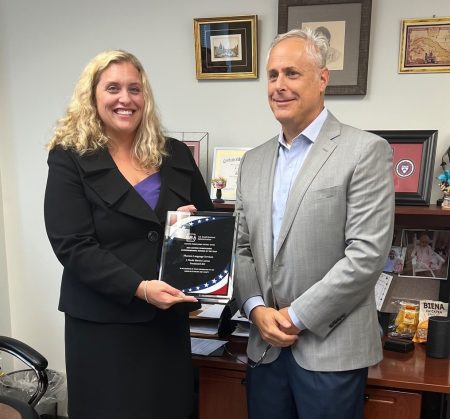Anna Claire Vollers | (TNS) Stateline.org
Melissa Ezell, a vet at a clinic in Huntsville, Alabama, noticed changes at her workplace as private equity firm National Veterinary Associates took over.
Ezell and other vets felt pressure from management to make more money from each appointment, leading to a focus on offering additional services and seeing more patients outside of normal hours.
Ezell, who started working at the clinic in 2021, said that there was no pressure to make a certain amount of money before, but that changed after the clinic was acquired by National Veterinary Associates.
The clinic, owned by National Veterinary Associates, was acquired by global private equity firm JAB Consumer Partners in 2020, leading to a shift in atmosphere and a greater emphasis on increasing profits by early 2023, according to Ezell.
The entry of private equity into the human health care industry has recently caused public outrage and legislative scrutiny. drawn public outrage and legislative scrutiny with firms being accused of increasing prices, reducing services, and closing hospitals to maximize profits for shareholders.
Now, some veterinarians and advocates are concerned that private equity's involvement in the pet health care industry could lead to similar outcomes.
Certain states already have laws preventing non-veterinarians from owning veterinary practices, and some consumer advocates want states to review large-scale acquisitions in the industry.
Dr. Grant Jacobson, a veterinarian from Iowa, who serves on the board of the Independent Veterinary Practitioners Association, stated that many private equity funds view veterinary medicine as a profitable area and have driven up prices for consumers, limited market competition, and bypassed laws prohibiting non-veterinarians from owning veterinary practices.
In recent years, private equity firms like Shore Capital Partners, KKR, TSG Consumer, and JAB Consumer Partners have made significant investments in veterinary practices, specialty animal hospitals, pet insurance services, and pet food companies.
According to private equity firms, their investments are providing clinics and providers with the necessary capital to improve technology and efficiency. Additionally, corporate chains can often offer their employees better benefits, including health insurance.
National Veterinary Associates stated that their corporate philosophy is rooted in vets making medical decisions rather than a corporate office, and that their shared ownership program by veterinarians is the largest in the industry and unique among their peers.
The National Veterinary Associates stated that their goal is to create a network of hospitals that pet owners have faith in, are easy to reach, and offer the best care possible.
JAB Consumer Partners did not reply to Stateline’s request for comment.
More pets means more money
Private equity uses combined investment funds from pension funds, endowments, and wealthy individuals to acquire controlling interests in companies. These firms typically seek a quick profit on their investment before selling it within a few years. In recent years, they have been purchasing small businesses in various industries — such as nursing homes to car washes.
As pet ownership has risen sharply during the COVID-19 pandemic, private equity quickly followed suit. The pandemic years of 2020-2022 were “the peak years for private equity acquisitions of veterinary services and practices,” said Michael Fenne, senior coordinator for health care at the Private Equity Stakeholder Project, a nonprofit watchdog group that advocates for communities affected by private equity ownership.
Americans set a record by spending $147 billion on pet products and services last year. From 2017 to 2022, private equity invested $45 billion in deals within the veterinary sector, according to PitchBook, which monitors investment data.
The vet industry is attractive as it mainly consists of small, privately owned businesses that larger companies can purchase and merge into larger chains. Additionally, it is largely a cash-based business: Unlike in human health care, veterinary customers generally pay out of pocket rather than relying on third-party payers such as insurance companies.
In some instances, private equity firms and other companies purchase community clinics from the veterinarians who own them for two, five, or even 10 times their value. The firms then incorporate them into a larger chain of clinics that can dominate a regional market.
It’s a tactic that can force other private owners out of the business, according to Jacobson, the Iowa veterinarian. He spent nearly 20 years working at a privately owned practice in Iowa and had hoped to buy it when the original founder retired.
But the founder sold the practice to a large veterinary chain owned by Mars Inc. — the private company known for owning candy brands such as M&Ms — for over $1 million more than his offer, Jacobson said. Mars, although not a private equity firm, is the largest consolidator of pet care companies in the United States, owning pet food companies, pet pharmacies, and veterinary care clinic chains like Banfield Pet Hospitals and BluePearl.
About a quarter of general veterinary practices and about three-quarters of specialty practices, such as emergency and surgery care, are now owned by large corporations, according to John Volk of Brakke Consulting, a veterinary management consulting firm.
Some private equity-backed chains, such as National Veterinary Associates, purchase community-based veterinary practices like Ezell’s without rebranding them under the chain’s name. As a result, clients might not be aware of the ownership change.
“It can seem that you’re receiving community-oriented care when in reality there are big-box motivations underlying [the clinic] that come from their private equity owners,” Fenne said.
Veterinarians' Preferred Workplace
Lori Kogan, a professor at Colorado State University’s College of Veterinary Medicine and Biomedical Sciences, surveyed around 900 vets in 2022 about their experiences and opinions on corporate versus privately owned vet clinics.
Though most surveyed vets work for corporate-owned clinics, Kogan found that over half would rather work in privately owned ones. The benefits offered by corporate chains, like health insurance, were not strong enough to outweigh other preferences, according to Kogan.
“Feeling like they have a say in decision-making, feeling recognized as an individual, those things are really important to people,” she said. “I think corporate ownership could achieve those things, but it will require attention.”
Ezell, a vet who left National Veterinary Associates, mentioned that the pressure affects patients and their owners too.
“Either you’re persuaded into additional services that may or may not be necessary, or you feel rushed,” Ezell said. “You feel like you don’t have enough time with the vet, and you leave without fully understanding what was done to your pet or what is wrong with them if they’re sick.”
In a statement to Stateline, National Veterinary Associates noted that it has made “continued investment in technology and infrastructure, pioneering clinical research, industry-leading continuing education programs and wellbeing initiatives.”
Can States Intervene?
In August, Thrive Pet Healthcare announced the closure of the only 24-hour emergency vet clinic in the Rochester, New York, area. Thrive is a chain of over 500 vet clinics and hospitals based in Austin, Texas, owned by private equity firm TSG Consumer.
“The idea of the only 24-hour emergency pet care center in our entire area closing was really scary,” said Rachel Barnhart, a Democratic member of the Monroe County Legislature in New York who has taken her dogs to the clinic. “We are a community of over a million people. The notion that we can't support a 24-hour pet facility is outrageous.”
Barnhart sent a letter to the Federal Trade Commission, urging it to investigate Thrive, which operates over a dozen clinics in Rochester. She mentioned seeing the FTC take action against anticompetitive practices in the vet industry elsewhere and felt that Thrive deserved similar scrutiny.
Thrive management conveyed in a letter to Barnhart and in media reports that a shortage of ER vets made it impossible to hire enough staff to keep the 24-hour clinic open. However, Barnhart suspected the company wanted to close the clinic because its staff had recently voted to unionize. CEO Tad Stahel stated in the letter to Barnhart that the closure was not related to staff unionization.
In 2022, the FTC took action against JAB Consumer Partners, which had recently acquired various vet and pet service companies. The FTC required the firm to sell some of its vet clinics in California, Colorado, Texas, Virginia and Washington, D.C., as a condition for approving its multi-billion dollar purchases of two other multi-state vet care chains.
Fenne, from the advocacy group, said it would be a positive first step if states allowed officials or agencies to check similar large-scale mergers and acquisitions in the veterinary industry in order to protect consumers.
Some states such as Iowa, Minnesota, New Jersey, New York, and North Carolina already have laws that forbid non-veterinarians from owning veterinary practices. This is meant to prevent corporate interests from influencing veterinarians’ medical decisions.
Experts and advocates anticipate more corporatization in veterinary care as companies acquire not only vet clinics, but also other businesses in the pet care field.
In February, the huge asset management firm Blackstone Inc. made an acquisition. Blackstone Inc. bought Rover, the largest online platform for pet sitting, dog walking, and other services. In the past two years, JAB has bought several of the biggest pet insurance companies in the United States and Europe.Ezell, the veterinarian from Alabama, ultimately chose to work at another privately owned clinic in town. She will begin there in a few weeks.
She told Stateline that not all corporate medicine is bad, and exceptional veterinarians and supportive staff can be found anywhere.
She added, “But it’s easy to lose sight of your values. The whole reason we’re doing this is we want to make a difference in animals’ and people’s lives. If we’re unable to do that, shouldn’t we try to fix that?”
States Newsroom is a national nonprofit news organization focused on state policy.
Stateline is part of ©2024 States Newsroom. Visit atstateline.org
. Distributed by Tribune Content Agency, LLC. Private equity’s expansion into human health care has been accused of raising prices, reducing services, and closing hospitals to maximize profits. Veterinarians believe the pet health care industry could experience similar outcomes.. Distributed by Tribune Content Agency, LLC.









